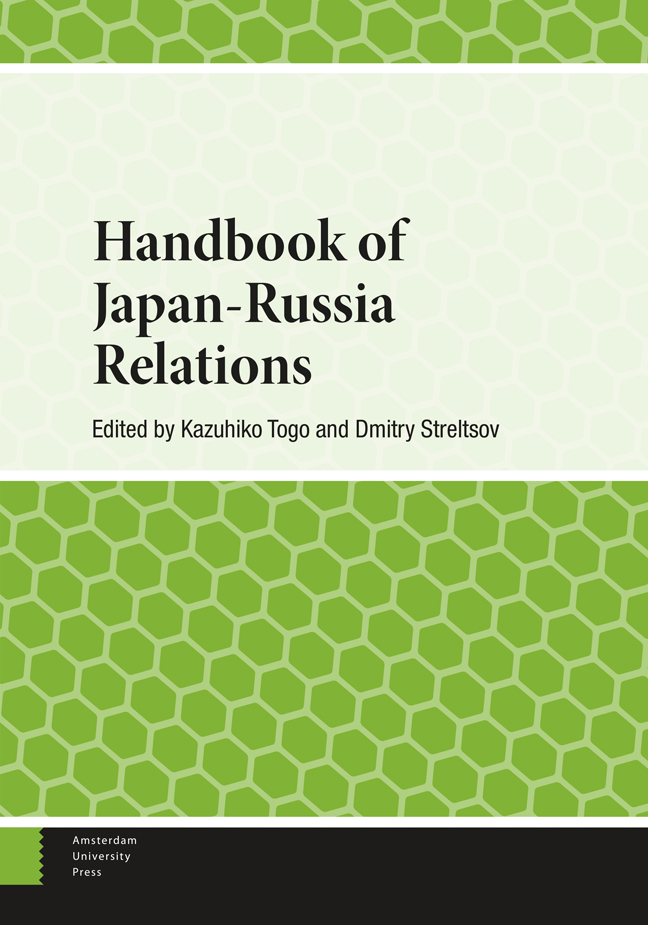Book contents
- Frontmatter
- Contents
- Dedication
- Acknowledgements
- Contributors
- Abbreviations
- Introduction
- Part 1 War and Peace: Diplomatic Relations and Security
- Part 2 Territory
- Part 3 The Economy and Energy
- Part 4 Disaster Cooperation
- Part 5 Culture
- Part 6 Perceptions of the Other
- Appendix 1 1956 Joint Declaration
- Appendix 2 Tokyo Declaration (1993)
- Appendix 3 Moscow Declaration (1998)
- Appendix 4 Irkutsk Statement (2001)
- Appendix 5 Foreign Ministry Statement (2022)
- Index
Appendix 4 - Irkutsk Statement (2001)
Published online by Cambridge University Press: 26 March 2024
- Frontmatter
- Contents
- Dedication
- Acknowledgements
- Contributors
- Abbreviations
- Introduction
- Part 1 War and Peace: Diplomatic Relations and Security
- Part 2 Territory
- Part 3 The Economy and Energy
- Part 4 Disaster Cooperation
- Part 5 Culture
- Part 6 Perceptions of the Other
- Appendix 1 1956 Joint Declaration
- Appendix 2 Tokyo Declaration (1993)
- Appendix 3 Moscow Declaration (1998)
- Appendix 4 Irkutsk Statement (2001)
- Appendix 5 Foreign Ministry Statement (2022)
- Index
Summary
On 25 March 2001, Prime Minister Yoshiro Mori of Japan and President Vladimir Vladimirovich Putin of the Russian Federation held talks in Irkutsk. Both parties expressed their satisfaction that bilateral relations are demonstrating further progress in all areas following the visit to St. Petersburg of the Prime Minister of Japan in April 2000 and the visit to Tokyo of the President of the Russian Federation in September 2000.
The two leaders had an in-depth exchange of views regarding peace treaty issues based on the points agreed in the Statement by the Prime Minister of Japan and the President of the Russian Federation on the Issue of a Peace Treaty signed on 5 September 2000.
Both parties state that, in the 1990s, qualitative activation of the negotiation process led to a more profound understanding of each other’s position. The Krasnoyarsk Agreement, in which both sides agreed to make their utmost efforts to conclude a peace treaty by the year 2000 on the basis of the 1993 Tokyo Declaration on Japan-Russia Relations, provided a crucial, positive impetus to negotiations. Both parties pointed out that work toward the realization of the Krasnoyarsk Agreement had achieved important results, and that such creative drive must be sustained into the future.
In this connection, based on the conviction that the conclusion of a peace treaty will encourage further activation of progressive development in Japan-Russia relations and herald a qualitatively new stage in those relations,
Both parties,
– Agreed to further negotiations regarding the conclusion of a peace treaty on the basis of documents adopted thus far, including the 1956 Japan-Soviet Joint Declaration, the 1973 Japan-Soviet Joint Communique, the 1991 Japan-Soviet Joint Communique, the 1993 Tokyo Declaration on Japan-Russia Relations, the Moscow Declaration on Building a Creative Partnership between Japan and the Russian Federation, the 2000 Statement by the Prime Minister of Japan and the President of the Russian Federation on the Issue of a Peace Treaty, and this Statement;
– Confirmed that the 1956 Japan-Soviet Joint Declaration is a basic legal document that established the starting point in the negotiation process for the conclusion of a peace treaty subsequent to the restoration of diplomatic relations between both countries;
– Based on this confirmation, agreed to promote future negotiations to accomplish complete normalization of Japan-Russia relations by means of concluding a peace treaty through the solution of issues concerning the attribution of the islands of Etorofu,
- Type
- Chapter
- Information
- Handbook of Japan-Russia Relations , pp. 395 - 396Publisher: Amsterdam University PressPrint publication year: 2024



